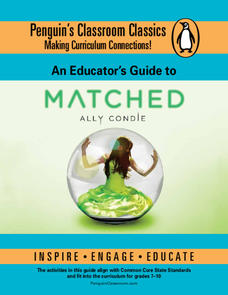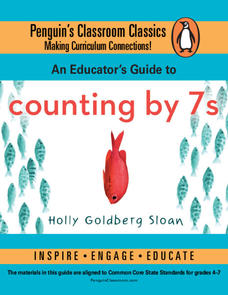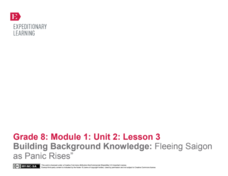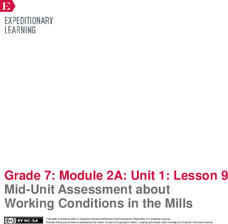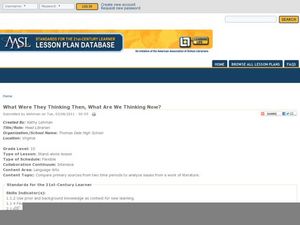Penguin Books
An Educator's Guide to Matched by Ally Condie
Even supposed Utopian societies have their flaws. Using an educator's guide, individuals explore the society Ally Condie creates in Matched. Reflective writing prompts double as discussion questions and cover key themes in the novel, as...
Penguin Books
An Educator's Guide to Counting by 7s
Everyone takes a different journey through grief. A series of lesson plans for the novel Counting by 7s introduces readers to the main character who loses her parents in a car crash. Discussion questions and writing prompts combine...
Penguin Books
An Educator’s Guide to Savvy by Ingrid Law
Literature circles give learners a chance to explore a novel in a unique way. An educator's guide for the book Savvy uses literature circles as part of the novel study. Additional activities cover elements of figurative language and...
EngageNY
Rereading and Close Reading: Communism, “The Vietnam Wars,” and “Last Respects” (Pages 85 and 86)
What might a papaya symbolize? Using the resource, scholars look for examples of symbolism in the novel Inside Out & Back Again. They also participate in a silent discussion called a Chalk Talk, writing their responses to a...
EngageNY
Building Background Knowledge: "Fleeing Saigon as Panic Rises”
How can scholars better understand the refugee experience? Pupils read Fox Butterfield's article "Panic Rises in Saigon, but the Exits are Few" and connect it to the novel Inside Out & Back Again. They annotate the text, looking for...
EngageNY
Reading the Map and Beginning Chapter 1
Seventh graders begin their study of Linda Sue Park's A Long Walk to Water by discussing scenarios related to the novel with a partner. The discussion topics invite pupils to consider how various factors, such as war and poverty,...
EngageNY
Building Background Knowledge: The Dinka and Nuer Tribes Until the Mid-1980s (“Sudanese Tribes Confront Modern War” Excerpt 1) (Version 1)
Readers consider comparisons between the Dinka and Nuer tribes in South Sudan, making connections between an informational article about Sudanese tribes and the novel A Long Walk to Water by Linda Sue Park. They annotate the text to help...
EngageNY
Launching Lyddie
Pupils engage in a close reading of chapter one of Katherine Paterson's novel, Lyddie. After answering text-dependent questions based on their reading, they complete reader's notes about how the setting, characters, and plot interact.
EngageNY
Mid-Unit Assessment about Working Conditions in the Mills
Pupils demonstrate their knowledge of how setting impacts character development by completing a mid-unit assessment based on Katherine Paterson's novel Lyddie. They answer multiple-choice questions and cite textual evidence to...
EngageNY
Analyzing Textual Evidence: Working Conditions in the Mills
Deafening, dusty, debris. Such were the working conditions in the 1800s textile industry as portrayed in Katherine Paterson's novel Lyddie. Scholars watch a short video clip about life and work in the mills. Next, they work...
EngageNY
Framing Lyddie’s Decision and Practicing Evidence Based Claims
Scholars grapple with whether the title character of Katherine Paterson's novel, Lyddie, should sign a petition about working conditions at the factory. They engage in close reading and discussion before adding their thinking about the...
EngageNY
Forming Evidence-Based Claims: Should Lyddie Sign the Petition?
Pupils reread selected passages from Katherine Paterson's novel Lyddie. After they finish, individuals gather textual evidence supporting whether Lyddie should sign a controversial petition and record their findings on graphic...
K20 LEARN
Lord of the Flies Unit, Lesson 2: Leader of the Pack
The second lesson in the Lord of the Flies unit asks scholars to consider the characteristics of a good leader. After generating a list of these qualities, they annotate a passage from the novel highlighting the leadership qualities of...
K20 LEARN
Lord of the Flies Unit, Lesson 6: I've Got The Power
Readers of Lord of the Flies consider the symbols of power William Golding uses in his dystopian novel and support their choice with evidence from the text.
Curated OER
Hatchet: Multicultural Strategy
Sometimes it's easier to read one part of a novel when focusing on discussion points. Partners work together to read a few paragraphs of Chapter 5 from Gary Paulsen's Hatchet and discuss the plot and theme of the book.
Curated OER
Pride and Prejudice: Biopoem
Describe yourself or a character from Jane Austen's Pride and Prejudice with a biopoem activity. Using the provided format, kids write their own characteristics or the character traits from the novel to create a poetic portrait.
Curated OER
Pride and Prejudice: Concept/Vocabulary Analysis
Clarify the setting, literary themes, and potential vocabulary issues with a concept analysis resource. With thoughtful explanations of many parts of Jane Austen's Pride and Prejudice, the reference sheet will be a great...
Curated OER
Running Out of Time: Letter to a Character
Once your learners have a firm handle on the characters in Running Out of Time, invite them to write letters to chosen characters about the events of the novel. Pupils then share with others who wrote to the same character.
Curated OER
Lesson Plan 8: Setting and Mood
What mood does this story evoke? How are setting and mood linked? Young novelists explore the different emotions brought about by writing, starting by journaling things that inspire their own feelings. Examine the word mood, looking into...
Curated OER
What Were They Thinking Then, What Are We Thinking Now?
Choosing an issue from a play or novel, researchers find two primary sources from different time periods to compare how people's views have changed. Many questions are listed to guide young writers. In the end, learners produce a...
Curated OER
Shizuko’s Daughter: Selective Reading Guide
Examine the text of Kyoko Mori's Shizuko's Daughter with a reading guide. With questions that prompt kids to refer to the reading as well as to their own experiences and opinions, the guide is an effective way to keep them engaged...
Curated OER
Shizuko’s Daughter: Knowledge Rating Scale
How well do your kids know key terms from Shizuko's Daughter by Kyoko Mori? Have them review a list of words that they will encounter in the novel, and mark which words they know well, which words they've seen before, and which...
Curated OER
Reading: Using Novels
Students practice their pre-reading and post-reading skills. A worksheet and answers are included in this lesson.
Curated OER
John H. Ritter Novels
Students read the books writing by John H. Ritter and complete discussion questions about them. In this reading lesson plan, students answer discussion questions for 4 different books.


